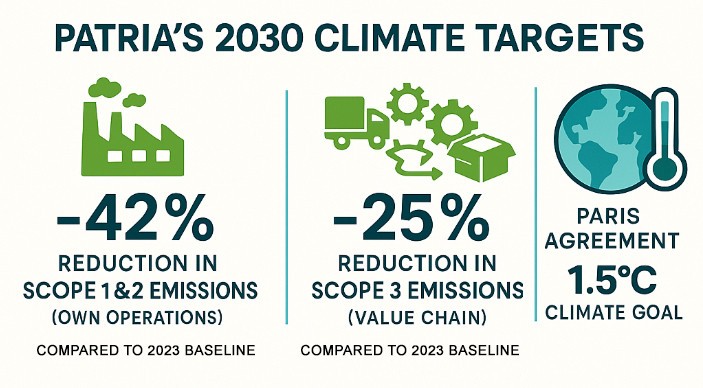

Driving climate action
Patria is committed to the United Nations Sustainable Development Goals (SDGs) and are a signatory to the United Nations Global Compact.
Climate change is material sustainability topic for Patria and is related to UN Sustainability Development Goal (SDG) number 12 “Climate action”.
Patria has been committed to the Science Based Target initiative since 2022 and to promote sustainable development in its operations by means of concrete measures. The Science Based Targets initiative (SBTi) is a partnership between the World Wide Fund for Nature (WWF), the World Resources Institute (WRI), the United Nations Global Compact (UNGC), and the Carbon Disclosure Project (CDP). Its purpose is to enable businesses to set ambitious emission reduction targets in line with the latest climate science. Read more at SBTi.
Patria has received final approval in 2024 for its near-term targets 2030. These targets align with the Paris Agreement and support the ambition to limit global warming to 1.5 degrees Celsius.
Patria’s validated emission reduction near-term targets 2030
- Reduce absolute scope 1 and 2 (own operations) emissions by 42% by 2030 compared to the baseline year 2023
- Reduce absolute scope 3 (value chain) emissions by 25% by 2030 compared to the baseline year 2023

The targets apply to the entire Patria Group, including all subsidiaries and the Millog Group. The biggest impact on lowering emissions comes from co-operation with the value chain, as it represents the majority of the Group’s greenhouse gas (GHG) emissions.
Patria’s climate impacts for scope 1 and 2 consist of greenhouse gas emissions from electricity, heating and fuels. Validated SBTi-target is to reduce absolute scope 1 and 2 emissions by 42% compared to the baseline year 2023. The primary strategies for reducing Patria’s emissions focus on utilizing sustainably sourced electricity and heating, as well as reducing emissions in the company’s own energy production processes. Other actions include the use of renewable fuels, which is currently being piloted in military vehicles. By implementing energy-saving measures in property maintenance and daily operations, Patria can effectively reduce its carbon footprint.
Patria’s primary climate-related impacts originate from indirect emissions within its supply chain. Patria’s validated SBTi target is to reduce absolute Scope 3 greenhouse gas emissions from the purchased goods and services, waste generated in operations, use of sold products, end-of-life treatment of sold products, and investments by 25% by 2030 compared to the baseline year 2023. Thus, key measures to reduce Scope 3 emissions require co-operation with the value chain to reduce life-cycle emissions, increase sorting and recycling rates in our operations, minimize waste amounts, and reduce emissions of our investments.
Patria reports on the progress of its climate strategy according to Greenhouse Gas (GHG) protocol in the annual reports.




















